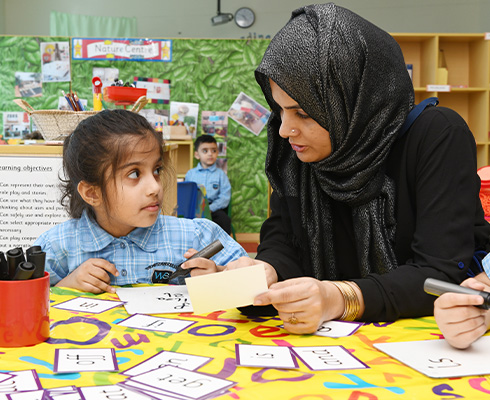
Inclusion
Students of Determination
GEMS Westminster School Sharjah is an inclusive school that celebrates diversity. The GEMS vision for Inclusive Education is that we achieve excellence together by all students receiving the support they need to meaningfully belong to their school and wider community, feel valued for their contributions, engage purposefully in learning and experience academic, cultural, social and emotional success in a common learning environment.
At GEMS Westminster School Sharjah we understand that children have a range of learning preferences, including students of determination (students with special education needs and disabilities), students who are gifted and talented and students who are English Language Learners. Our staff are committed to educating all students in a common learning environment with similar-aged peers. At GEMS Westminster School Sharjah diversity is seen as a strength, respectful relationships are continually enhanced and our children all participate in learning through adjustments and teaching strategies tailored to meet the diverse range of learners reflected in wider society.
To ensure that we are able to meet the learning needs of all our children, it is important that parents fully share details of any special educational needs, individual education plans (IEPs) and any Educational Psychologist, Pediatric, or other specialist reports (e.g., Speech and Language or Occupational Therapy) that have been completed. Sharing educational history with GEMS Westminster School Sharjah prior to a place being offered is essential so that staff can ensure an appropriate assessment of educational need, educational plan and resourcing is in place.
It is the aim of this policy to integrate the 4 principles and outcomes of the international educational initiative ‘Every Child Matters’ in order to meet the individual learning needs of all our students & to promote physical & social well-being.
WSS SEN Policy
The WSS SEN Policy aims to promote strategies for:
- Being physically Healthy.
- Student being supported to promote and ensure mental and emotional health.
- Staying Safe.
- Providing a safe and secure environment to enable all learners to achieve their full potential.
Enjoy & Achieve
- Student of all abilities to be supported to achieve their potential in personal and social development.
- Ensuring that students are aware of what constitutes bullying and what they do if they come across it.
- Providing an environment where all students, regardless of any physical disability, can access the social and educational aspects of school.
- Encouraging and supporting inclusive learning regardless of gender, culture, academic, social, physical and emotional needs.
- Making a positive contribution within family, school & the wider community (World Citizenship).
- Where possible involving student in decisions about their future experience and roles in school (Leadership).
- Encouraging positive behavior in the school community which shows respect for others (Universal Values).
Achieve Economic Well being (Forward Thinking)
Providing student with the preparatory life skills to enable future independent living and economic well-being.
Along with the 5 outcomes of ‘Every Child Matters’, WSS believes strongly in the GEMS Four Core Values and continuously links these into the teaching and learning in our school. Our Code of Conduct supports the 5 outcomes of ‘Every Child Matters’ and GEMS Core Values.
What 'Special Educational Needs' Means
The term 'special educational needs' (SEN) has a legal definition, referring to student who have learning difficulties or disabilities that make it harder for them to learn or access education than most students of the same age. Many students face some kind of SEN at some point during their education. Help will usually be provided in their ordinary, mainstream early education setting or school, sometimes with the help of outside specialists.
Aims
In order to deliver a high standard of educational provision for students with SEN, WSS will:
- Invest in a range of choice of provision and service.
- Allocate resources to ensure realistic support is available to students and their families through collaborative early identification and intervention.
- Adopt a structured approach to assessment, as described in the SEN Code of Practice, and ensure consistence of practice across all sectors in support of student and young people with SEN.
- Consider the viewpoints of parents/carers, students and professionals involved & facilitate student’s/young person’s involvement in the decision-making processes where appropriate.
- Respect student and parental choice, notwithstanding the need to meet our responsibilities to maximise student achievement through appropriate interventions.
- Maximise student participation in their own education and their role as citizens within their learning, family and social communities.
- Match student need with relevant support interventions and school facilities.
- Provide a broad, balanced and suitably differentiated curriculum in support of student and young people with SEN and severe low incidence disabilities.
- Ensure that student progress is reviewed regularly against clearly defined learning outcomes suited to the child or young person’s abilities, aptitudes and potential.
- Provide a comprehensive programme of continuing professional staff development for teaching and support staff commensurate with their defined areas of responsibilities.
- Ensure that there are comprehensive and effective support procedures, staffed by appropriately qualified professionals, to support student/young people with SEN and their parents/carers.
- In order to help SEN students, WSS has a graduated response that recognises there is a continuum of special educational needs that require a range of intervention and support. The school will record the steps taken to meet the needs of individual student. The SENCO will have responsibility for ensuring that records/portfolios are kept, are confidential and available as appropriate.
The Role of the SENCO in WSS
- The SEN Coordinator (SENCO) responsibility may include:
- Overseeing the day-to-day operation of the school’s SEN policy.
- Coordinating provision for students with special educational needs.
- Liaising with and advising parents, support assistants and involved teachers.
- Overseeing the records of all SEN students.
- Liaising with parents of students with special educational needs.
Individual Education Plans (IEP)
An Individual Education Plan (IEP) is a written document that is a planning, teaching and reviewing tool.
We use IEPs to underpin the process of planning intervention for SEN students. It records the actions that are additional to, or different from, the content of the regular differentiated curriculum plan which is in place as part of provision for all student. All IEPs are formulated in conjunction with the individual student, the parents and any external agencies that are supporting the learning of the child.
Once an IEP is written it is shared using a ‘child friendly’ format.
IEPs are:
- Written by the teacher with support from SENCO.
- SMART (Specific, Measureable, Achievable, Realistic, Time bound).
- Reviewed Termly, more often if necessary. SENCO will give a least two weeks’ notice for review date.
- Supported by annotated evidence.
Assessment
The SENCO will discuss SEN st. assessment needs with concerned Trs & AC. The class teacher and the SENCO will continually monitor and assess student’s progress through a regular cycle of observation, evaluation and both formal and informal assessment. Should a child need further support they will move on to an Individual Educational Plan? During this process, information from the parents is also sought and valued. Formal assessments may also be administered by private agencies supporting the student at the request of the parent.
Record Keeping
The SENCO organizes provision for SEN& Gifted & Talented (G&T). It is the class teacher’s responsibility to keep the class screen up to date as new student enter their classes. This information is also updated by the school Nurse and the school Registrar. The class teachers and the SENCO are responsible for the completion of all appropriate paperwork relevant to the student.
SENCO, along with the class teacher, are responsible for completing the paperwork required for external agency requests & the paperwork relevant to supporting students with SEN at all stages of achievement. A review of the learning support assistant’s input will take place each term.
All records are considered to be confidential and are only accessible to SLT & concerned members of staff and parents. Information may only be shared with an external agency with the written permission of the parent.
Monitoring Process
Student’s progress will be tracked at a number of levels by:
- The class teacher responsible for the delivery and monitoring of IEP's.
- Half termly reviews of the IEP's by the class teacher and SENCO.
- Completion of Class Screens.
- Completion of the Record of Initial Concern.
- Regular meetings between the Team Leaders and the SENCO and between the SENCO, HOS and the Principal.
- Regular meetings between the class teachers and the TL/HOD.
Success Criteria
Students’ success can be measured by:
- Their completion of IEP targets.
- Movement up through the ELL steps/stages.
- By a reduction in the quantity of support they require in order to continue progressing.
- Achieving their Curriculum targets.
- Achieving or exceeding their extension targets.
Policy Review
The WSS SEN/Inclusion Policy will be reviewed as and when necessary to respond to any changes to GEMS/WSS policy.
WSS, guidance for students is both formal & informal (ie. during the normal course of school life & staff-student communication, as well as after a particular incident or concern). Teachers are proactive in seeking assistance from the Student Counselors whenever any student is in particular need of guidance and counseling. It is the duty of the concerned staff to refer any student experiencing challenges in academic, personal-social or emotional areas for counseling.
Guidance counselling is an integral part of our stepped behavior policy, & forms the basis of any Individual Behaviour Plan.




